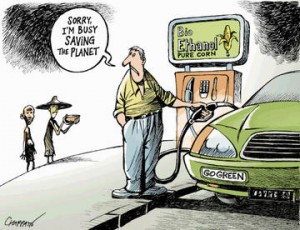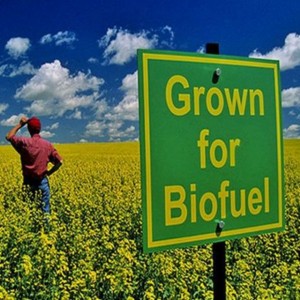We all have heard about bio-fuels but what exactly are they? Bio-fuels are fuels utilized in their liquid form which are derived from materials such as waste plant and animal matter. Nowadays, the popularity of bio-fuels is increasing tremendously. The reason which can be attributed to this significant increase in popularity is the rise in oil prices and the need for energy security.
Petrol and diesel are ‘ancient bio-fuels’. But we know them as fossil fuels as they are made from decomposed plants and animals that have been buried in the ground for millions of years. Bio-fuels are very much similar, except for the fact that they are made from plants being grown today!
There are mainly two types of bio-fuels – bio-ethanol and bio-diesel. These are being used as a replacement for petrol and diesel respectively. Bio-fuels can be used as a fuel for vehicles in its pure form, but it is usually used as a diesel additive. The reason behind this practice is to reduce the levels of particulates, carbon monoxide and hydrocarbons from diesel-powered vehicles. Vehicles play a big role in the production of atmospheric carbon dioxide which is the main greenhouse gas that causes global warming.
But since plants absorb carbon dioxide for their growth, we can think of an idea that crops grown for bio-fuels should suck up about as much carbon dioxide as that which comes out of the cars that burn these fuels! And unlike the fossil fuels which are still in use, bio-fuels are a renewable resource, since we can always grow more crops which can be later used as fuel.
For the future, a better way of making bio-fuels will be from grasses and saplings, which contain more cellulose (a type of material found in the cells of plants). If this cellulose can be turned into bio-fuel, it will emit less carbon dioxide and also prove to be more efficient than the current bio-fuels. Hence, bio-fuels have come up in a big way by representing an immense growth area around the world and have an important role to play in replacing different types of fuels the world has been using in the past.
But, there are various social, technical and environmental issues relating to the production and use of bio-fuels which has been debated widely in the media and science journals for a long time now. These include the effect of moderating oil prices, the “food v/s fuel” theory, carbon emission levels, sustainable bio-fuel production, and environmental concerns such as deforestation, loss of biodiversity, soil erosion, and impact on water resources to name a few.
Why use Bio-fuels?
Bio-fuels are a top priority for a number of reasons. But the two most important reasons are as follows.
- There is an urgent need to move towards more renewable and sustainable fuels as the transport of today is completely dependent on the finite amount of fossil fuels still left on Earth. And with this rate of usage of these fossil fuels without any sense of renew ability, we will face a catastrophe in the near future very soon.
- The second reason is that transport is the third largest emitter of greenhouse gases and bio-fuels can significantly reduce this carbon footprint.
As there are two sides to every coin, there are two sides to the application of bio-fuels. We need to be aware of both of these sides. The advantages and disadvantages of the use of bio-fuels.
Advantages:
- Bio-fuels are a much cleaner source of energy than conventional sources and so can reduce the amount of greenhouse gases emitted by a big margin.
- Use of bio-fuels will ensure a reduction in the use of fossil fuels.
- Bio-diesel can be used in any diesel vehicle and it also reduces the amount of vibrations, smoke and noise produced.
- Bio-diesel is biodegradable.
- Transport costs will decrease with increased use of bio-fuels.
- While oil is a limited resource coming from specific materials, bio-fuels are manufactured from a wide range of materials including crop waste, manure, and other by products. This also proves to be an efficient step in recycling.
- Fossil fuel production takes a very long time but bio-fuels are easily renewable as new crops are grown and waste material is collected in very less time comparatively.
- Burning of bio-fuels produces less carbon output and fewer toxins which makes them safe.
Disadvantages:
- Use of bio-fuels may lead to increase in the price of certain foods which are employed in its production such as corn.
- The development and production of bio-fuels is still heavily dependent on oil.
- Soil erosion is of huge concern with the increase in the use of bio-fuels.
- Large quantity of water is required for proper growth of plants for bio-fuels production, especially in dry climates.
- Development of new technology for vehicles to use the bio-fuels will lead to an increase in their prices significantly.
The Future of Bio-fuels
Bio-fuels may not prove to be the best option to solve the current energy problems of the world. To solve the issue of dwindling fossil fuel reserves, all viable means of harvesting energy should be pursued to their fullest. However, the fact still remains that bio-fuels are a reliable alternate energy resource. With more investment in development and research, the disadvantages of bio-fuels can be eliminated making them suitable for widespread consumer use.



Leave a Reply